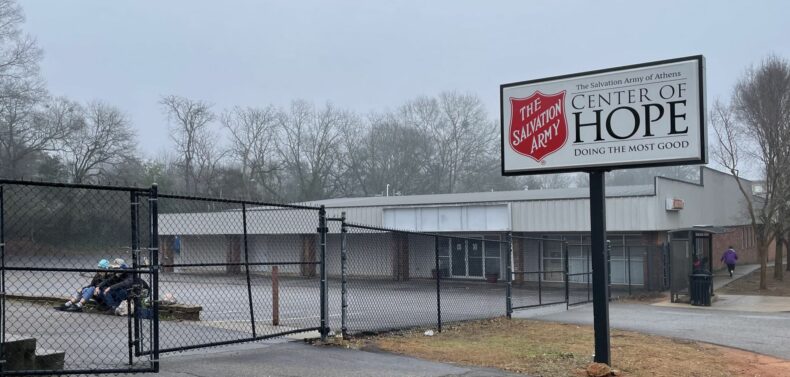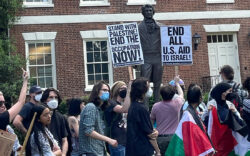Based on recommendations from last fall’s strategic plan to reduce and prevent homelessness, Athens-Clarke County approved $2.8 million of American Rescue Plan Act (ARPA) funds for local nonprofits. Proposals are now being accepted for homeless supportive services, unsheltered homeless activities and increasing low-barrier shelter. But to the shock of many organizations, an exception was made for the Salvation Army of Athens, which was able to bypass the lengthy application process for funds.
On Jan. 15, the ACC Mayor and Commission received a collective response from the Athens Area Homeless Shelter (AAHS), Bigger Vision, Family Promise and Project Safe addressing four commissioners’ recent proposal to award the Salvation Army a $550,000 grant. The grant was approved at the commission’s Jan. 2 meeting, after disputes over a conflict of interest involving commissioner John Culpepper, who cosponsored the proposal and sits on the Salvation Army board. The funds will go toward new beds and facility improvements at the Salvation Army’s Center for Hope shelter. Commissioners reasoned that this route would take the most people off the streets in the shortest amount of time.
While the united shelters recognize the need to invest in the Salvation Army, they were never granted the same opportunities for funding. Despite their expertise and track record of successful services, they must wait in line like everyone else. The response letter states that as long standing providers in the Athens area, they too deserve the same consideration allotted to the Salvation Army.
“It is confounding that we, as proven shelter providers, were shut out of the streamlined, easy, efficient process offered to the Salvation Army in response to their unsolicited proposal,” the letter reads.
The statement goes on to suggest that the greatest community benefit would be to allocate ARPA funding to other existing shelter programs in the same manner. Furthermore, all four contributing agencies were willing to submit individual funding proposals before the commission’s next meeting on Feb. 6.
ARPA funds are time-limited and must be allocated by December 2025. Meanwhile, the request for proposal process that nonprofits must undergo, competing for these funds, is an extensive one. According to Madison Sanders, the executive director for Family Promise, RFPs maintain strict timelines and can take from one to several months to execute, depending on the type of grant. The RFP application requires various documents including budget proposals, equity/risk assessments, financial statements and letters of support. Only after the commission approves these items can the contracting process start. Nonprofits must float costs until they are reimbursed after their contracts are executed. For example, the Family Promise eviction prevention program was approved in May, but did not begin operating until September.
Sanders said that the release of the current RFP application, which closes Mar. 8, was delayed due to the commission’s recent actions, creating further time restraints for providers.
“We are in a critical period where ARPA funding has the ability to be used as a real investment into our community, but that opportunity is dwindling as time goes by,” Sanders said. “Getting the funding out to service providers quickly and ethically is integral to ensure that we are serving the needs of the community.”
The letter also pointed out that the Salvation Army closed for months in 2022, a time when homelessness was on the rise in Athens, leaving other service providers to pick up the slack.
Sanders, along with the executive directors of AAHS and Bigger Vision, Shea Post and Ryan Hersh, are commission-appointed members of the ARPA Homelessness Advisory Committee. The committee members and their respective organizations all belong to the Athens Homeless Coalition, an umbrella group that is using ARPA funds to add staff. As key partners in funding decisions, the advisory committee has worked extensively with consultants the Cloudburst Group to develop the final draft of the strategic plan. The Salvation Army, however, was not a part of this advisory committee.
“To be honest, it was a huge time investment… In the end, I’m not sure that the plan really responded to the advisory committee’s guidance,” Post said. “It’s a long, complicated history that’s gone into creating this plan and quite frankly, the mayor and commission keep changing it.”
This is not the first time that the commission has given preemptively to unsolicited proposals. In March 2022, the commission authorized the allocation of ARPA funds for designated program areas or “buckets” including youth development and violence prevention, affordable housing, business development and workforce support, homelessness and behavioral health. The commission voted to grant $2.875 million– all the funds within the youth development bucket–to the Boys & Girls Club in June, 2023, less than a month after their request. Similarly, all $4 million in the behavioral health bucket were released to Advantage Behavioral Health Systems, which serves the advisory group for that bucket, to build an inpatient mental health facility.
Like what you just read? Support Flagpole by making a donation today. Every dollar you give helps fund our ongoing mission to provide Athens with quality, independent journalism.










